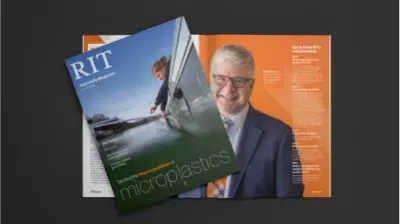Sustainable Engineering Master of Engineering Degree
- RIT /
- Rochester Institute of Technology /
- Academics /
- Sustainable Engineering ME
A sustainable engineering degree that helps you minimize the effects a product has on the environment at every stage of its lifecycle–from conception, development, and prototyping to commercialization, recycling, and disposal.
Overview for Sustainable Engineering ME
This program is no longer accepting new student applications.
Students interested in this program might also be interested in the MS in sustainable systems.
Sustainable engineering refers to the integration of social, environmental, and economic considerations into product, process, and energy system design methods. Additionally, sustainable engineering encourages the consideration of the complete product and process lifecycle during the design effort. The intent is to minimize environmental impacts across the entire lifecycle while simultaneously maximizing the benefits to social and economic stakeholders.
The master of engineering in sustainable engineering is multidisciplinary and managed by the industrial and systems engineering department. The program builds on RIT’s work in sustainability research and education and offers students the flexibility to develop tracks in areas such as renewable energy systems, systems modeling and analysis, product design, and engineering policy and management. The degree is offered on campus and may be completed on a full- or part-time basis.
Educational Objectives
This sustainable engineering degree is designed to accomplish the following educational objectives:
- Heightened awareness of issues in areas of sustainability (e.g., global warming, ozone layer depletion, deforestation, pollution, ethical issues, fair trade, gender equity, etc.).
- Clear understanding of the role and impacts of various aspects of engineering (design, technology, etc.) and engineering decisions on environmental, societal, and economic problems. Particular emphasis is placed on the potential trade-offs between environmental, social, and economic objectives.
- Strong ability to apply engineering and decision-making tools and methodologies to sustainability-related problems.
- Demonstrated capacity to distinguish professional and ethical responsibilities associated with the practice of engineering.
Plan of Study
Technical in nature, the program equips engineers with the tools they need to meet the challenges associated with delivering goods, energy, and services through sustainable means. In addition to basic course work in engineering and classes in public policy and environmental management, students are required to complete a capstone project directly related to sustainable design challenges impacting society. Many of these projects can be incorporated into sustainability themed research by RIT faculty in the areas of fuel-cell development, life-cycle engineering, and sustainable process implementation.
Students must successfully complete course work and a capstone project. This program is designed to be completed in three semesters.
Curriculum for Sustainable Engineering ME
Current Students: See Curriculum Requirements
Sustainable Engineering, ME degree, typical course sequence
| Course | Sem. Cr. Hrs. | |
|---|---|---|
| First Year | ||
| ISEE-785 | Fundamentals of Sustainable Engineering |
3 |
This is a high level survey course that reviews the product lifecycle from various perspectives and highlights the leverage over material, process, and environmental impacts available at the design phase. Tools and strategies for reducing the environmental impacts associated with the sourcing, manufacture, use, and retirement of products will be reviewed and evaluated. (This course is restricted to students in ISEE-MS, ENGMGT-MS, MECE-MS, MECE-ME, SUSPRD-MN, MIE-PHD, BIME-BS with a BIMEISEE-U subplan, ISEE-BS with a ISEEMS-U or ISEEEGMT-U subplan, or those with at least 4th year standing in ISEE-BS or ISEEDU-BS.) Lecture 3 (Fall). | ||
| ISEE-771 | Engineering of Systems I |
3 |
The engineering of a system is focused on the identification of value and the value chain, requirements management and engineering, understanding the limitations of current systems, the development of the overall concept, and continually improving the robustness of the defined solution. EOS I & II is a 2-semester course sequence focused on the creation of systems that generate value for both the customer and the enterprise. Through systematic analysis and synthesis methods, novel solutions to problems are proposed and selected. This first course in the sequence focuses on the definition of the system requirements by systematic analysis of the existing problems, issues and solutions, to create an improved vision for a new system. Based on this new vision, new high-level solutions will be identified and selected for (hypothetical) further development. The focus is to learn systems engineering through a focus on an actual artifact (This course is restricted to students in ISEE-MS, PRODDEV-MS, MFLEAD-MS, ENGMGT-MS, MIE-PHD, BIME-BS students with a BIMEISEE-U subplan, ISEE-BS students with a ISEEMS-U or ISEEEGMT-U subplan, or those with 5th year standing in ISEE-BS or ISEEDU-BS.) Lecture 3 (Fall, Spring). | ||
| MECE-629 | Renewable Energy Systems |
3 |
This course provides an overview of renewable energy system design. Energy resource assessment, system components, and feasibility analysis will be covered. Possible topics to be covered include photovoltaics, wind turbines, solar thermal, hydropower, biomass, and geothermal. Students will be responsible for a final design project. (Prerequisites: MECE-310 or equivalent course or graduate standing in MECE-MS or MECE-ME or SUSTAIN-MS or SUSTAIN-ME.) Lecture 3 (Fall). | ||
| ISEE-786 | Lifecycle Assessment |
3 |
This course introduces students to the challenges posed when trying to determine the total lifecycle impacts associated with a product or a process design. Various costing models and their inherent assumptions will be reviewed and critiqued. The inability of traditional costing models to account for important environmental and social externalities will be highlighted. The Lifecycle Assessment approach for quantifying environmental and social externalities will be reviewed and specific LCA techniques (Streamlined Lifecycle Assessment, SimaPro) will be covered. (This course is restricted to students in ISEE-MS, SUSTAIN-MS, ENGMGT-ME, MECE-MS, MECE-ME, SUSPRD-MN, MIE-PHD or those with at least 4th year standing in ISEE-BS or ISEEDU-BS.) Lecture 3 (Spring). | ||
Engineering Electives |
6 | |
| Second Year | ||
| ISEE-792 | Engineering Capstone |
3 |
Students must investigate a discipline-related topic in industrial and systems engineering. The general intent of the engineering capstone is to demonstrate the students' knowledge of the integrative aspects of a particular area. The capstone should draw upon skills and knowledge acquired in the program. (This course is restricted to students in ISEE-MS, ENGMGT-MS, PRODDEV-MS, MFLEAD-MS, BIME-BS students with a BIMEISEE-U subplan, or ISEE-BS students with a ISEEMS-U or ISEEEGMT-U subplan.) Lecture 3 (Fall, Spring). | ||
Engineering Elective |
3 | |
Social Context Elective |
3 | |
Technology Elective |
3 | |
| Total Semester Credit Hours | 30 |
|









